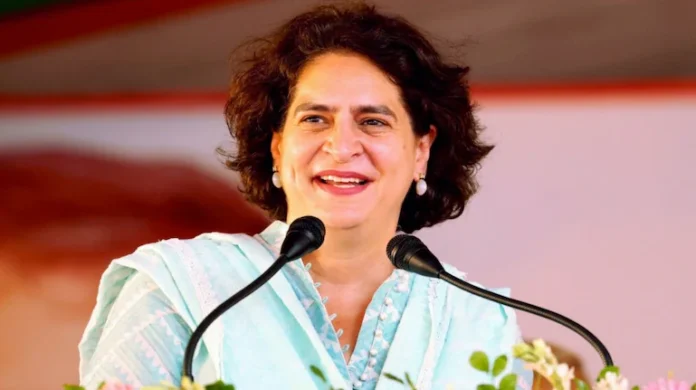Introduction
In a charged debate in the Lok Sabha, Congress General Secretary Priyanka Gandhi Vadra made headlines for her powerful rebuttal to an attempt to communalize the tragic deaths of civilians in a recent attack in Pahalgam, Jammu and Kashmir. While some members of the House tried to emphasize the victims’ religion — referring to them as “Hindus” — Priyanka Gandhi sharply responded with the assertion: “They were Indians, not just Hindus.”
Her comments have since sparked widespread conversation across social media and political circles, highlighting deeper tensions in India’s socio-political fabric — where nationalism, religion, and political opportunism frequently collide. This article delves into the incident, its political implications, and the broader message Priyanka Gandhi delivered through her intervention.
The Pahalgam Attack: What Happened?
On July 17, 2025, a terrorist ambush in Pahalgam, a popular tourist destination in South Kashmir, resulted in the tragic deaths of five civilians and injuries to several others. Early reports indicate the attack targeted a bus ferrying pilgrims returning from the Amarnath Yatra — an annual Hindu pilgrimage.
While initial investigations suggested the involvement of Pakistan-based terror outfits, what unfolded next in the Indian Parliament drew even more attention than the tragedy itself.
The Parliament Session: When Emotions Flared
During a Lok Sabha session held to discuss internal security and the situation in Jammu and Kashmir, several BJP MPs raised slogans and statements identifying the victims of the Pahalgam terror attack as “Hindus.”
They alleged that the government had not done enough to protect Hindu pilgrims and accused the opposition of being indifferent to attacks on the Hindu community. Some even went further to accuse Congress of being “anti-Hindu” — a narrative often used to corner the party politically.
Priyanka Gandhi’s Intervention: “They Were Indians First”
In a moment that caught both national and international attention, Priyanka Gandhi stood up and interrupted the discussion with a calm yet firm voice, saying:
“Stop dividing them in death. They were Indians. Don’t label them as Hindus, Muslims, or anything else. They were our fellow citizens.”
Her statement was met with applause from some opposition benches and fury from ruling party members, but it resonated strongly with many across India.
She continued:
“Terrorism does not ask for religion. When bullets fly or bombs blast, they kill humans — not Hindus, Muslims, or Christians. We should mourn as one, not split the grief into religious lines.”
Political Reactions
Congress and INDIA Bloc Support
Leaders from the Congress and other parties in the INDIA bloc praised Priyanka’s stance as a “voice of sanity” and a “reminder of the inclusive spirit of India.” Rahul Gandhi backed her message, tweeting:
“Terrorism must be condemned with unity, not religious division. Proud of Priyanka for standing up for India’s true identity.”
BJP’s Retort
However, BJP leaders responded with sharp criticism. Union Minister Smriti Irani accused Priyanka of “downplaying the reality of targeted killings,” implying that the Congress was avoiding uncomfortable truths about religiously motivated violence.
BJP spokesperson Sambit Patra went a step further, saying:
“By refusing to acknowledge the identity of the victims, Priyanka Gandhi insults the pain of their families.”
This exchange revealed the fundamental ideological clash between the ruling party’s majoritarian narrative and the Congress party’s emphasis on secular nationalism.
Media Coverage: Divided Like the Nation?
Indian news outlets reflected the same polarization seen in Parliament. Some mainstream channels lauded Priyanka Gandhi’s intervention as “a much-needed secular voice”, while others criticized her for “political correctness at the cost of reality.”
Social media, meanwhile, witnessed a flood of support for her statements, with hashtags like #TheyWereIndians and #PriyankaForUnity trending on Twitter/X.
The Larger Message: Unity in Times of Grief
Priyanka Gandhi’s choice of words reflects a growing concern that national tragedies are increasingly used for communal polarization. While the nation mourns, some political actors seek to manipulate public emotions for electoral gain.
Her statement touched on several key issues:
1. Humanity Above Identity
Her assertion reminds the country that the loss of innocent lives is a human tragedy, not a religious statistic.
2. Condemn Terrorism, Not Divide Victims
By insisting that the victims be remembered as Indians, she sent a strong message against sectarian interpretations of violence.
3. Reclaiming Secular Nationalism
At a time when nationalism is increasingly conflated with religious identity, Priyanka re-emphasized the constitutional values of India.
Why It Matters: A Battle for India’s Soul
In a democracy as diverse as India, the way leaders respond to violence sets the tone for national discourse.
- When religion is emphasized over citizenship, unity weakens.
- When politicians exploit death for votes, democracy erodes.
- When Parliament debates religion instead of policy, people lose faith in governance.
Priyanka Gandhi’s interjection was not just a comment on an incident — it was a rebuke of a pattern. A pattern where terror attacks are filtered through the lens of religion, not humanity. Her words may not shift votes immediately, but they reignite a conversation about the kind of India citizens want — one bound by shared citizenship, not divided by religion.
Priyanka Gandhi’s Evolution as a Politician
This episode is also significant for what it reveals about Priyanka Gandhi’s political evolution. Often seen as a backroom strategist, she has, in recent months, taken a more visible role in national politics.
Her intervention in Parliament displayed:
- Moral clarity in the face of emotional manipulation
- Political courage in challenging the dominant narrative
- Oratorical poise that contrasted sharply with the shouting matches that Parliament has become
In many ways, it echoed her grandmother Indira Gandhi’s steeliness in defending India’s pluralistic foundations.
Public Response: An India That Wants to Heal?
Ordinary Indians, weary of the constant barrage of religious polarization, seemed to embrace Priyanka’s words with relief. One viral comment on X read:
“For once, someone reminded us that we’re not just Hindus, Muslims, or Sikhs. We are Indians. That’s all that should matter.”
Others questioned why such a basic truth needs defending in 2025 — a sign of how deeply communalism has seeped into the national psyche.



